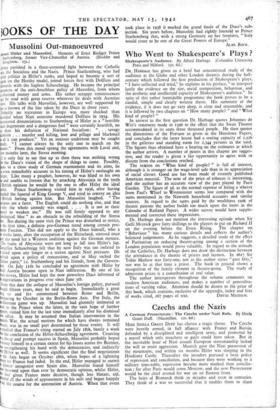OOKS OF THE DAY
Mussolini Out-manoeuvred
tun perished in a three-cornered fight between the Catholic Ey, the Socialists and the Nazis. PrinCe Starhemberg, who had
wed politics in Hitler's ranks, and hoped to become a sort of ent on the Horthy model, joined forces first with Dollfuss and ards with the hapless Schuschnigg. He became the principal ent of the anti-Anschluss policy of Mussolini, from whom obtained money and arms. His rather scrappy reminiscences
t be read with great reserve wherever he deals with Austrian s. His talks with Mussolini, however, are well supported by is known of the line taken by the Duce in those years.
Probably no statesman in Europe was more shocked than ssolini when Nazi assassins murdered Dollfuss in 1934. His ssioned denunciations to Starhemberg of Hitler as a " horrible degenerate and a dangerous fool " were certainly heartfelt, no
than his definition of National. Socialism: " . savage barism . . . murder and killing, loot and pillage and blackmail all it can produce." Yet an anxious undertone may be caught dy. " I cannot always be the only one to march on the er." From this mood sprang the agreements with Laval and, few months later, the Stresa meeting.
It is only fair to say that up to then there was nothing wrong the Duce's vision of the shape of things to come. Possibly, to a close study of German rearmament and its aims, he even remarkably accurate in his timing of Hitler's onslaught on pe. Like many a prophet, however, he was blind to his own and unable to foresee that by attacking Abyssinia in the teeth British opinion he would be the one to offer Hitler the ideal bit. Prince Starhemberg visited him in 1936, after having ded the funeral of King George V, and tried to convey an idea British feeling against him. But Mussolini laughed. " The ions are a farce. The English could do nothing else, and that why the whole comedy was staged. . . . It is not in their est to weaken as He was still firmly opposed to any ideological bloc " as an obstacle to the rebuilding of the Stresa t. But during the same visit the Prince was disturbed to notice, the first time, a definite pro-German trend among certain pro- nt Fascists. This did not apply to the Duce himself, who a weeks later, after the occupation of the Rhineland, stressed once e the need for a Western coalition against the German menace. The fruits of Abyssinia were not long to fall into Hitler's lap. cellor Schuschnigg felt that by now Italy was too isolated to le relied upon any longer as a screen against Nazi pressure. He solved upon a policy of concessions, and in May sacked the Italian party," i.e. Starhemberg and his friends, from the Govern- rot On July 11th he concluded an agreement with Hitler by Mich Austria became open to Nazi infiltration. By one of his awe moves, Hitler had kept the now powerless Duce informed of ie negotiations in progress ever since June 5th.
From this date the collapse of Mussolini's foreign policy, pursued Gough fifteen years, may be said to begin. Immediately a great tug to and fro commenced between Rome and Berlin, thainating by October in the Berlin-Rome Axis. For Italy, the ai-German game was up. Mussolini had gloomily intimated as kis to the Prince when the latter, in the vain hope of further IPport, visited him for the last time immediately after his dismissal an office. It may be assumed that Italian intervention in the Parish War, the actual motives for which have always remained nitre, was in no small part determined by these events. It will :recalled that Franco's rising started on July 18th, barely a week ter the conclusion of the Hitler-Schuschnigg agreement. Counting la cheap and prompt success in Spain, Mussolini probably hoped :recoup himself to a certain extent for his losses across the Brenner, as strengthening his hand with the democracies, and indirectly Os Hitler as well. It seems significant that the final negotiations "ha Axis began on October 18th, when hopes of a. lightning 40rY by Franco had faded. In the end, Hitler managed to outwit I former antagonist over Spain also. Mussolini found himself ire frowned upon than ever by democratic opinion, whilst Hitler, he had given Franco more decisive, though less blatant, aid, tiered all the winds of appeasement in his sails and began happily 'by the course for the annexation of Austria. When that event
took place in 1938 it marked the grand finale of the Duce's sub- jection. Six years before, Mussolini had rightly foretold to Prince Starhemberg that, with a strong Germany on her frontiers, " Italy would cease to be one of the Great Powers of Europe."
ALAN ROCK.


























 Previous page
Previous page